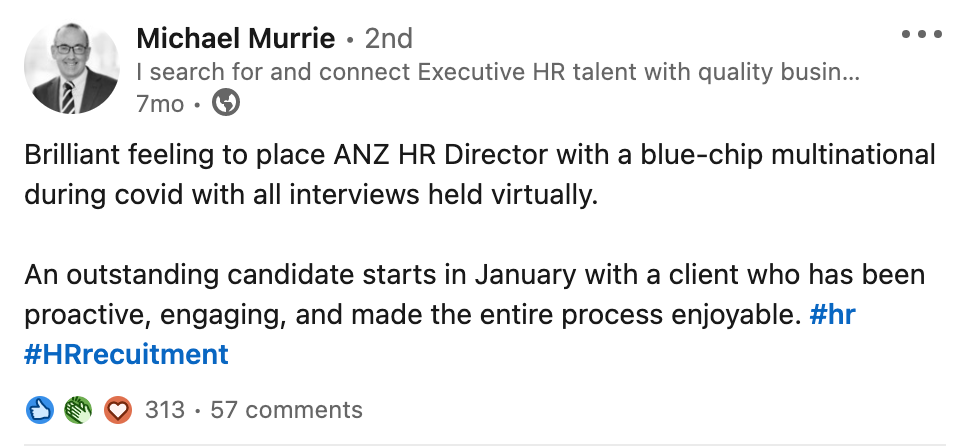Everyone’s trying to be one. In everything, it seems.
Content. Recruitment. Remote working. Being the best version of yourself.
We’re advocates of taking what your market tells you and putting it back out to your network online in the form of content. And if you’re talking to experts all day every day, ask for their experiences and perspectives and hey presto, you’ll look like an expert in your field too.
Only you aren’t, are you? Not really.
You recruit into Life Sciences. You aren’t actually involved in drug development.
You recruit into Automotive, you don’t make the cars.
You’re a Finance recruiter, not a CFO.
Coming across as a functional expert in your market is a good way to raise your profile in the industry. But chances are the people you’re connected to are legitimate experts in their field already. They’re hands on with it every day. Are they really going to consider you a peer? Or just a very in the know recruiter, at the end of the day?
True experts on LinkedIn niche down on their specific area of expertise. Yours is recruitment.
Unless you have a background in your market, chances are your real area of expertise is in recruiting into that industry. Position yourself that way and you’ll make it easier for job hungry candidates to seek out your services. And when clients need a recruitment partner they can trust, they’re more likely to come to you.
But how do you establish yourself as a recruitment expert on LinkedIn? Think about the behaviours of your target audience first of all.
Most of your potential customers are on there, same as you most mornings: just scrolling through, keeping an eye out for anything interesting. 9 times out of 10, they won’t have any specific intention in mind. They’re just information gathering. Or passively seeking out value.
But when they are ready to move jobs, hire someone into their team, or simply pick a half decent recruiter to engage with out of the absolute rabble on LinkedIn – they seek out experts.
Now forget about creating content for a second. Let’s say you’ve truly impressed someone with an outbound approach. Nailed a sales call and got your foot in the door. They’re a decision maker with buying power and they seem bought in. You might’ve even agreed on an in principle follow up. What’s the first thing they’re going to do after getting off the phone with you? Have their terms of business sent over, post haste?
They’re going to look for you on LinkedIn. On Google. Your website. They’re going to do their research. And what they find will influence who they give their business to.
You can be an absolute machine on the phone, but unless you’re covering off the online angle as well, you could be leaving business on the table – for people who are investing in their personal brand.
As we’ve said before, creating content and investing in an online brand doesn’t take away from what you do on the phone. It amplifies it.
So how do you make sure that when your prospects do their research they’re impressed with what they find?
Try this: Google your name now. Or get someone in the office to give you a real honest appraisal of your LinkedIn profile. Do you really look like a credible recruitment partner to top brands in your space? Or could you be doing more?
How To Be An Expert On LinkedIn
How often do you use success stories to support a BD pitch on the phone?
All the time, right? Because it’s proven to work, and it’s one of the best ways to illustrate that the claims you’re making can be backed up.
But how much do you talk about your successes on LinkedIn?
Hardly ever? Because it’s cringe, right? Only it doesn’t have to be.
Candidate Success Stories
If you’ve placed someone, and the client’s happy, the candidate’s happy – and you’re happy! – share it.
It can be easy to come across as arrogant. “Look at me! I made a placement! Check me out doing my job!”
But if it’s made you and all parties involved feel good, tell your network why. Check out this example from Personal Brand Academy graduate Michael Murrie:

Pretty simple, not arrogant. Just a good wholesome post. And some great engagement to boot.
Or how about this: most people don’t actually know how long a placement takes. So let’s say your most recent one wrapped up inside 24 hours, with both candidate and client ecstatic.
This is really valuable information, makes you look like a pretty darn credible recruitment partner, and casts your services in a favourable light without gloating.
Show that recruiters care about their customers as well as being successful and you’ve struck the sweet spot.
Client Case Studies
What would your clients say you’re like to work with? Only one way to find out really!
Ask them to write you a review. Or better yet, speak to them on zoom and ask them yourself. Record their answer, give it a quick edit to tidy up any ums and ahs, and it’s a great video testimonial to deploy on social.
Ask your clients what their situation was before you started working with them. How you’ve added value to the recruitment process. And what’s been the result of your work since then.
You’ve got more freedom to go into detail on video, and this kind of insight will make you look like an expert. Getting it in someone else’s words too is priceless social proof you’re good at what you do.
LinkedIn Recommendations
If someone’s taken time out of their day to write you a recommendation for your services, don’t just leave it on your profile where it’ll only be seen if people are looking for it.
Really simple: take a screenshot, publish it in a new post, and tag the person who wrote it.
Did it make you feel good to receive it? Feel proud of yourself? Good! Say that!
Same as with case studies, other people saying how good you are is infinitely more valuable than just you saying how good you are.
Internal Achievements
Snagged a promotion? Pipped Reece on the contract desk to employee of the month? Hit lunch club for the third quarter in a row?
You’ll see plenty of content like that in your feed, and your first reaction might be “who cares?”
That’s because there’s often one major thing missing: the reason why.
A post appears in your feed with the caption “Here’s to another lunch club with these ones!”. There’s a picture of some very smiley people sat in front of a nice looking dinner. But that’s pretty much it.
It’ll get 11 likes. And, more than likely, 0 leads.
Tell people what you did to make it to lunch club. And don’t just leave it at “hit my financial targets”. Say how.
Stayed until 8pm every evening one week canvassing a new market? Brought video into the interview process, saving time and increasing conversions? Worked really hard on your advertising and saw an uplift in quality applicants?
If you can give your passive network a good impression of why you’re successful at what you do, when the time comes to hire – or move jobs themselves – who are they more likely to come to?
Positioning yourself as a recruitment expert through producing credible content is probably the most lucrative kind of content you could be coming out with.
It’s what potential buyers of your service are looking out for all the time, even when they aren’t hiring or looking to move themselves. So if you’re producing content regularly, increasing your credibility in the market should be a major priority.
But without personality, no one will gravitate towards you. And if you’re not adding value with your content, it’s all just a bunch of hot air.
You need to get the balance right to be successful long term.




